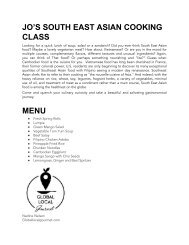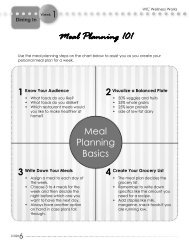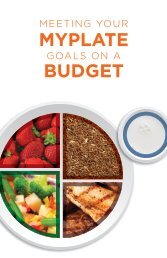APATT_CommunityActionGuide
Create successful ePaper yourself
Turn your PDF publications into a flip-book with our unique Google optimized e-Paper software.
Take Your Place Community Action Guide<br />
27<br />
Q&A: The School Snack–Obesity Connection<br />
A recent report by the Kids’ Safe and Healthful Foods Project examined state standards for the types<br />
of snacks that can be sold in secondary schools. In this Q&A, Jessica Donze Black, the project’s<br />
director, talks about the report’s findings.<br />
Q: You’ve just released a new report about school snacks—what did you find?<br />
Jessica Donze Black (JDB): We found that the majority of our nation’s students live in states where<br />
less-healthy snacks like full-fat chips and candy are readily available in snack bars, school stores and<br />
vending machines, but there is limited access to healthy snacks. What students are able to buy varies<br />
widely from state to state, with some offering healthy snacks and others primarily providing lesshealthy<br />
snack options.<br />
Q: Why should we care about the kind of snacks sold in schools?<br />
JDB: What we know is that obesity rates have more than tripled among children and teens over the<br />
past three decades, leaving nearly one in three kids overweight or obese. Research also shows that<br />
110 to 165 calories per day—the difference between eating an apple or a bag of chips for a snack—<br />
may be responsible for these skyrocketing obesity rates among children. And a study released this<br />
summer shows that strong nutrition standards for snack foods sold in schools may help reduce<br />
students’ weight gain.<br />
Q: Will healthier snacks in schools really make a difference when many other factors play into<br />
childhood obesity and chronic disease?<br />
JDB: Many children get as many as half of their daily calories while at school, so what they eat and<br />
drink there does play a major role in contributing to their overall health and well-being. In addition,<br />
school is where many children learn dietary habits that will last them a lifetime, so it is beneficial to<br />
begin teaching them to choose healthier alternatives while they are young.<br />
Q&A reprinted courtesy of the Robert Wood Johnson Foundation (2012).

















